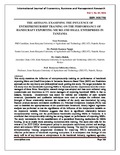| dc.contributor.author | Kazungu, Isaac | |
| dc.contributor.author | Ngugi, Patrick Karanja | |
| dc.contributor.author | Rotich, Gladys | |
| dc.contributor.author | Otieno, Romanus Odhiambo | |
| dc.date.accessioned | 2018-11-24T08:27:24Z | |
| dc.date.accessioned | 2020-02-07T08:38:22Z | |
| dc.date.available | 2018-11-24T08:27:24Z | |
| dc.date.available | 2020-02-07T08:38:22Z | |
| dc.date.issued | 2018 | |
| dc.identifier.citation | Kazungu, I., Ngugi, P. K., Rotich, G., & Otieno, R. O. THE ARTISANS: EXAMINING THE INFLUENCE OF ENTREPRENEURSHIP TRAINING ON THE PERFORMANCE OF HANDICRAFT EXPORTING MICRO AND SMALL ENTERPRISES IN TANZANIA. | en_US |
| dc.identifier.uri | http://repository.must.ac.ke/handle/123456789/1242 | |
| dc.description.abstract | This study examines the influence of entrepreneurship training on performance of handicraft exporting Micro and Small Enterprises in Tanzania. Resource Based View (RBV) and Positivism approach are the key theory and philosophical touch guiding this study. The target population for this study were the handicrafts exporting MSEs in Tanzania and the respondents were the owner-managers of these firms. Descriptive research design was adopted and data were collected using questionnaire and interviews to 171 owner-managers of exporting handicraft MSEs in Dar es Salaam, Tanzania. Questionnaire was tested for validity and reliability of each variable construct. Quantitative and qualitative techniques were used to analyse the collected data. Strength of linear relationship between the variables of the study was determined by using Pearson product-moment correlation coefficient (r). Principal Component Analysis (PCA) was used to establish the appropriateness of the questionnaire constructs. Binary logistic regression analysis was performed to test the significance of the influence of the independent variable on the dependent variable. Evidence suggests that there is significant relationship between entrepreneurship training and the performance handicrafts exporting MSEs in Tanzania. It is concluded that entrepreneurship training has strong impact on performance of exporting MSEs. The study recommends for the establishment of a specialized financing mechanism for MSEs funding, so as to enable them accessing entrepreneurship training. The study also calls for the review of the 2003 SMEs’ development policy to incorporate institutional context and settings, which will enhance MSEs’ access to entrepreneurship training. The need for instituting vibrant entrepreneurship training programmes necessary for exporting MSE’s sustainability and effective performance of handicraft exporting enterprises. It is anticipated that findings of this study will be of key interest to entrepreneurs in the handicraft industry, regulatory agencies,government agencies offering entrepreneurship training at all levels, policy makers, researchers and scholars with interests in international business, and entrepreneurship development. These findings will also serve as a frame of reference to future research studies and projects in the areas of entrepreneurship development and export trade. | en_US |
| dc.language.iso | en | en_US |
| dc.publisher | International Journal of Economics, Business and Management Research | en_US |
| dc.subject | Entrepreneurship training, Performance, Exporting, Handicraft MSEs, and Tanzania. | en_US |
| dc.title | THE ARTISANS: EXAMINING THE INFLUENCE OF ENTREPRENEURSHIP TRAINING ON THE PERFORMANCE OF HANDICRAFT EXPORTING MICRO AND SMALL ENTERPRISES IN TANZANIA | en_US |
| dc.type | Article | en_US |

